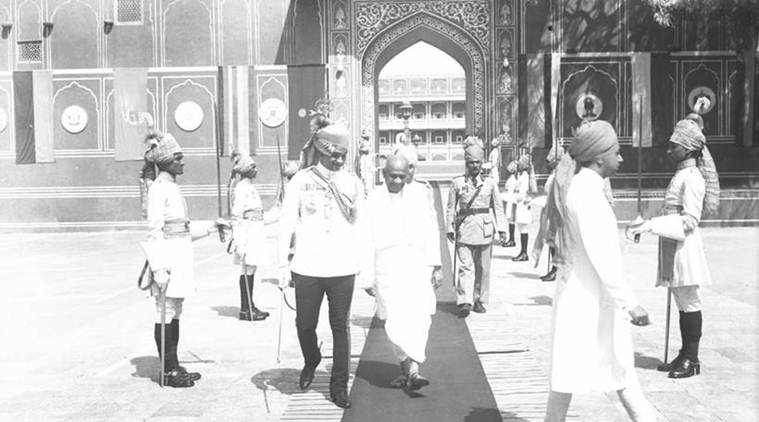 Sardar Patel with the Maharaja of Jaipur. (Kulwant Roy collections)
Sardar Patel with the Maharaja of Jaipur. (Kulwant Roy collections)
“The problem of the States is so difficult that you alone can solve it,” said the Father of the nation Mahatma Gandhi to Sardar Vallabhbhai Patel when faced with the biggest problem left by the British while departing India. The ‘iron man of India’, Patel was valued on one hand for being politically astute and on the other hand for his pragmatic acumen, necessary to bring together the more than 500 bits and pieces of royal territories into the fold of the Indian union.
The issue of the princely states was not an easy affair to resolve. Often perceived to be dissolute and inept, the princes had largely been pampered by the British on one hand, and taken advantage of on the other for their own political gains. Unsurprisingly, when the British announced their departure, most of the princes thought it to be the best moment to claim independent statehood. There were many others, who were caught in a tug of war between India and Pakistan.

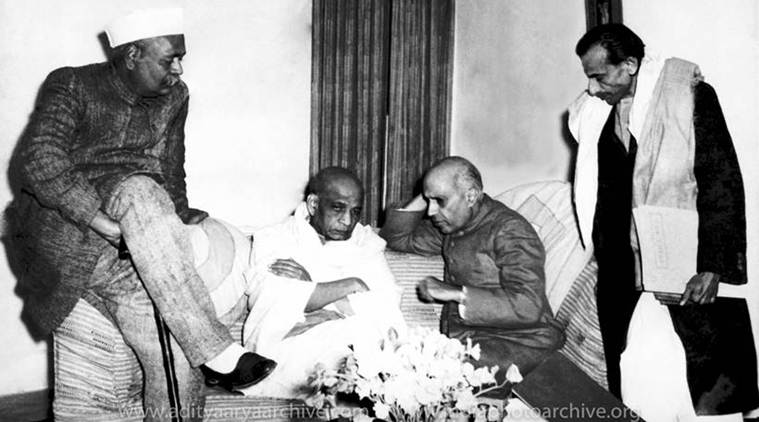 Acharya Kriplani with Jawaharlal Nehru, Sardar Patel and Rajendra Prasad. (Kulwant Roy collection)
Acharya Kriplani with Jawaharlal Nehru, Sardar Patel and Rajendra Prasad. (Kulwant Roy collection)
While the Congress had made clear their intention of unifying the princely states into the Indian union, the issue of cajoling and convincing the princes was a task that had to be accomplished with much caution and dexterity. The princes are known to have been scared of Nehru, and in a lot of cases disliked him as well. The monumental task therefore fell in the hands of the pragmatic administrator Patel. “Through the spring of 1947, Patel threw a series of lunch parties, where he urged his princely guests to help the Congress in framing a new constitution of India,” writes historian Ramachandra Guha in his work, “India after Gandhi.” Often referred to as the “Bismark of India”, Patel was instrumental in bringing India together.
Incidentally, Patel was also the first Congress statesman to have supported Partition as the most viable solution to Muslim separatist movement in India, even though he did not foresee the large scale violence it would lead to. On June 27, 1947, he was made the minister in charge of the new States Department. He, along with his secretary, V.P. Menon, were given the task of negotiating with the princes. Between them, they produced a draft instrument of accession which would be signed by the princes as an agreement to transfer control of defence, foreign affairs and communications to the Congress government. Patel often invoked the patriotism of the princes in his attempt to convince them to join India. On other occasions he reminded them of the possibility of anarchy and on event of their refusal to join. He also introduced the concept of ‘privy purses’ as a payment to be made to the families of the princes for their agreement to integrate with India.
If Patel was the one who laid out the initial framework for persuading the princes to join, it was his alert and intelligent secretary, V.P. Menon, who did the actual groundwork of coaxing them. As noted by Guha, Menon was the first to urge the British government not to support fanciful claims to independence. Menon would often travel to the court of the princes and negotiate with them on a one to one basis. He went on to record his experience in what still remains to be the most detailed work on the issue of the princely states, “The story of the integration of the Indian states.”

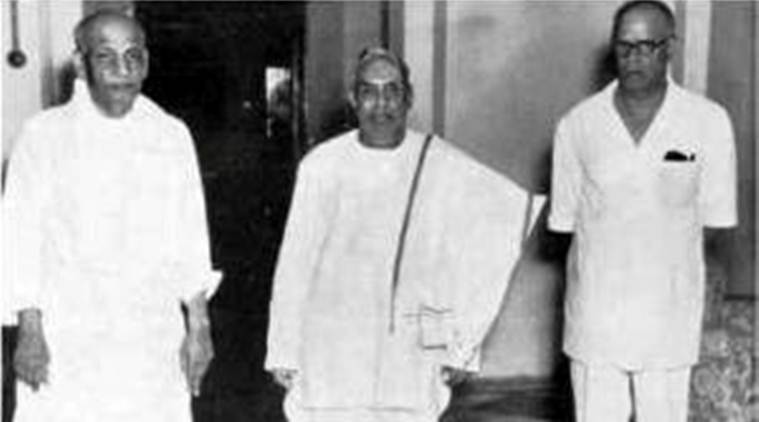 Sardar Patel and V.P. Menon with Maharaja of Kochin (Wikimedia Commons)
Sardar Patel and V.P. Menon with Maharaja of Kochin (Wikimedia Commons)
In his book, Menon records the ordeals involved in negotiating with the rulers. The princes would often invoke descent from Hindu Gods and Goddesses to lay claim to independent statehood. Then there were others who proudly proclaimed a history of having resisted Muslim invaders in the past. There were some who could be won over simply through the offer of the privy purse, and then there were others who demanded to retain their palaces and titles in return for acceding to India. This was the case with the Maharaja of Chhota Hazari, would would hold on to his title and pass it on to his son as well.
A particularly interesting and challenging case of negotiating with the princes was offered by the ruler of Jodhpur. The Maharaja of Jodhpur had made up his mind to join Pakistan instead of India. Menon, on realising the problems it could lead to, met with him at the Viceroy’s house. Menon frantically looked out for Mountbatten to persuade the stubborn prince. Mountbatten is believed to have coaxed the young ruler, by reminding him of the disappointment his deceased father would have experienced on hearing his decision. He finally left the two together, promising the prince that Patel and Menon would be tolerant towards his personal demands once he decided to join India. Once left with Menon, the ruler signed the instrument of accession, and soonafter revealed a miniature pistol that he pointed at Menon stating loudly, “I am not giving in to your threats.” However, the pistol was soon confiscated by Mountbatten.
The final touch in the process of persuading the states was applied by the Viceroy Lord Mountbatten. Patel, Nehru and Gandhi had approached the Viceroy, pleading him to aid them in the process of integrating the princely states, which was necessary so that India is not left in a state of Balkanisation and disruption.
Most Read 1Cricket World Cup: Jasprit Bumrah & Mohammed Shami add their name to elite list of fast-bowling twins 2Bengaluru: After missing multiple deadlines, Japanese tech-backed adaptive signals to be commissioned by December-end 3When Shah Rukh Khan said he took Salman Khan’s wedding proposal to a woman, but failed: ‘Iska behaviour theek nahi hai’ 4Deepika Padukone kept the promise she made to mehendi artist Veena Nagda in 2013: ‘She stuck to her words…’ 5Today in Politics: Day after Kerala blasts, CM Vijayan to hold all-party meet; Shinde Sena MP resigns over Maratha quota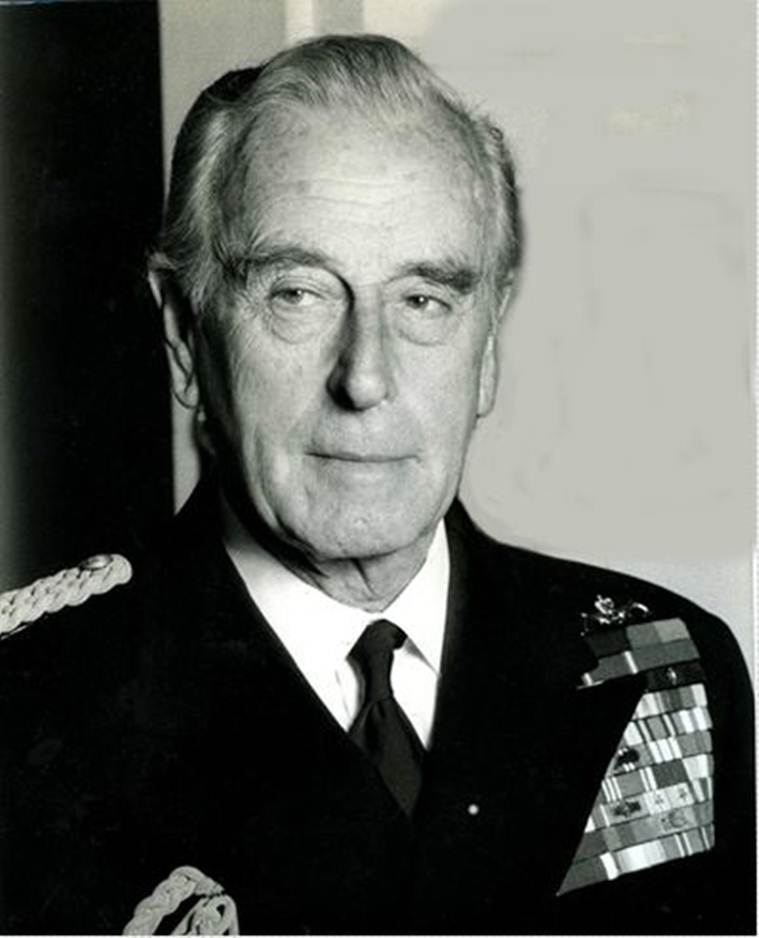 The final touch in the process of persuading the states was applied by the Viceroy Lord Mountbatten. (Wikimedia Commons)
The final touch in the process of persuading the states was applied by the Viceroy Lord Mountbatten. (Wikimedia Commons)
On July 25, Mountbatten addressed the Chamber of princes with the aim of “tossing apples” into Patel’s basket. “Look forward ten years, consider what the situation in India and the world will be then, and have the foresight to to act accordingly,” he said as he urged the princes to join the union. Once he ended his speech and welcomed questions from the princes, Mountbatten was reportedly quite taken aback by the absurdity of their prime concerns. As recorded by writers Dominique Lapierre and Larry Collins in their celebrated work ‘Freedom at midnight’, “The prime concern of one member of that distinguished gathering was whether he could retain the exclusive right to hunt tigers in his state if he acceded to India. The diwan of another prince, whose employer at this critical juncture had found nothing better to do than to go on a tour of Europe’s gambling casinos and cabarets, pleaded that as his ruler was on the high seas, he did not know what course of action to adopt.”
The Viceroy is believed to have then dramatically played around with a round glass paperweight, referring to it as a crystal ball that had answers to their queries and suggested with all ferocity, “sign the Act of Accession.”
Also ReadHere is what happened in Kedarnath, and rest of Uttarakhand, in 2013Here is everything you need to know about Indian JewsFrom Vivekananda to Motilal Nehru: The Indian leaders believed to have jo…How Bengali became an official language in Sierra Leone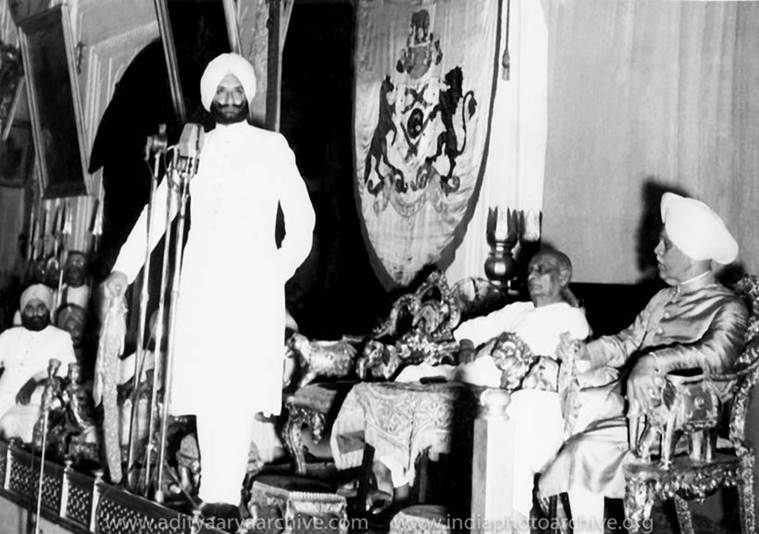 In the following days, Patel, Menon and Mountbatten managed to convince most of the princes to join the Indian union. (Kulwant Roy collection)
In the following days, Patel, Menon and Mountbatten managed to convince most of the princes to join the Indian union. (Kulwant Roy collection)
In the following days, Patel, Menon and Mountbatten managed to convince most of the princes to join the Indian union. Bikaner, Baroda and a few other states from Rajasthan were the first to join. There were few quite dramatic and tragic cases of accession as well. For instance, one Raja of Central India is known to have died of a heart attack, seconds after signing. The Gaekwad of Baroda is believed to have wept like a child on the shoulders of Menon after acceding. As the day of independence drew closer, Patel decided on using force where necessary, for instance in the case of the Maharaja of Orissa. Finally, as a the tricolour rose proudly to announce its independence on August 15, 1947, the ‘iron man of India’ along with Menon and the Viceroy had managed to bring together more than 550 states under the governance of the Indian union.
© IE Online Media Services Pvt Ltd

